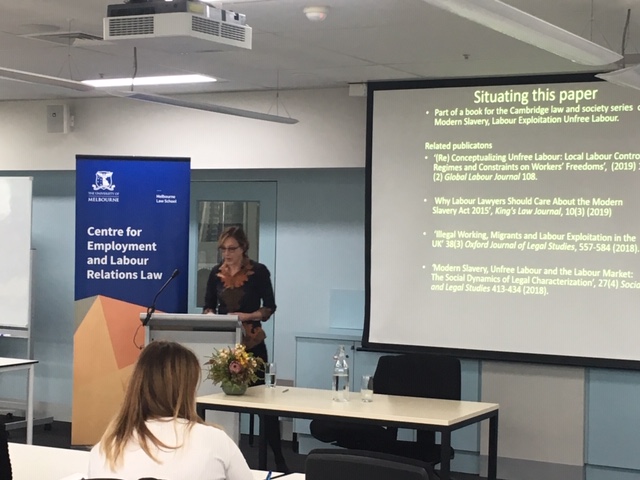From Combatting Human Trafficking to Eradicating Modern Slavery: Assembling a Global Governance Regime (May 2019)
Presented by Professor Judy Fudge.
CELRL Labour Law Seminar
From Combatting Human Trafficking to Eradicating Modern Slavery: Assembling a Global Governance Regime
Seminar presented by Professor Judy Fudge
Tuesday 28 May 2019: 1–2pm at Melbourne Law School
About the event
Modern slavery is an umbrella term that focuses attention on commonalities across legal concepts such as forced labour, slavery, domestic servitude and human trafficking, brought together in the Protocol to Prevent, Suppress and Punish Trafficking in Persons, especially Women and Children. In 2015, the United Nations announced that eradicating modern slavery is Target 8.7 of its Sustainable Development Goals. In 2016, the International Labour Organization launched Alliance 8.7, which is a global strategic partnership of different stakeholders committed to ending modern slavery and in 2017 it partnered with Walk Free Foundation to launch a revised Global Slavery Index. In 2017, the UK and US governments also announced donations of $25 million dollars each to the Global Fund to End Modern Slavery, a private-public partnership whose goal is to ‘identify and promote business sector efforts to create market-based solutions to slavery’ in order ‘to sustainably end modern slavery by making it economically unprofitable’.
How did modern slavery come to be viewed as a problem of such epic proportions? How was a global governance network composed of powerful states, the UN General Assembly and its sister institutions, NGOs, human rights activists and organizations, religious groups, big business and philanthrocapitalists, a new group of wealthy business owners who manage their own charities, assembled? What is the effect of assembling a global governance network that embraces a multifaceted approach to extirpating modern slavery? The paper addresses these questions reflecting on what it means for how we understand the role of labour law and labour standards.
About the speaker
Judy Fudge joined the School of Labour Studies, McMaster University in Hamilton, Canada on 1 July 2018. She began her academic career in Canada, where she was Professor at Osgoode Hall Law School, York University (1987 - 2006) and Lansdowne Chair in Law at the University of Victoria (2007 - 2013), before moving to England to teach at the University of Kent (2013 - 2018). She has held visiting professorships and fellowships at several universities and institutes. She takes a socio-legal approach to studying work and labour. Her most recent work focuses on labour exploitation, modern slavery and unfree labour in the context of labour migration, and she working on a book on that topic.
Recent Publications include: ‘Why Labour Lawyers Should Care About the Modern Slavery Act 2015’, King's Law Journal, (2019) DOI: 10.1080/09615768.2018.1549699; ‘Illegal Working, Migrants and Labour Exploitation in the UK’ 38(3) Oxford Journal of Legal Studies, 557 - 584 (2018); Regulating for Decent Work in a Global Economy’ 43(2) New Zealand Journal of Employment Relations,10-23 (2018); ‘Modern Slavery, Unfree Labour and the Labour Market: The Social Dynamics of Legal Characterization’, 27(4) Social and Legal Studies 413 - 434 (2018).
